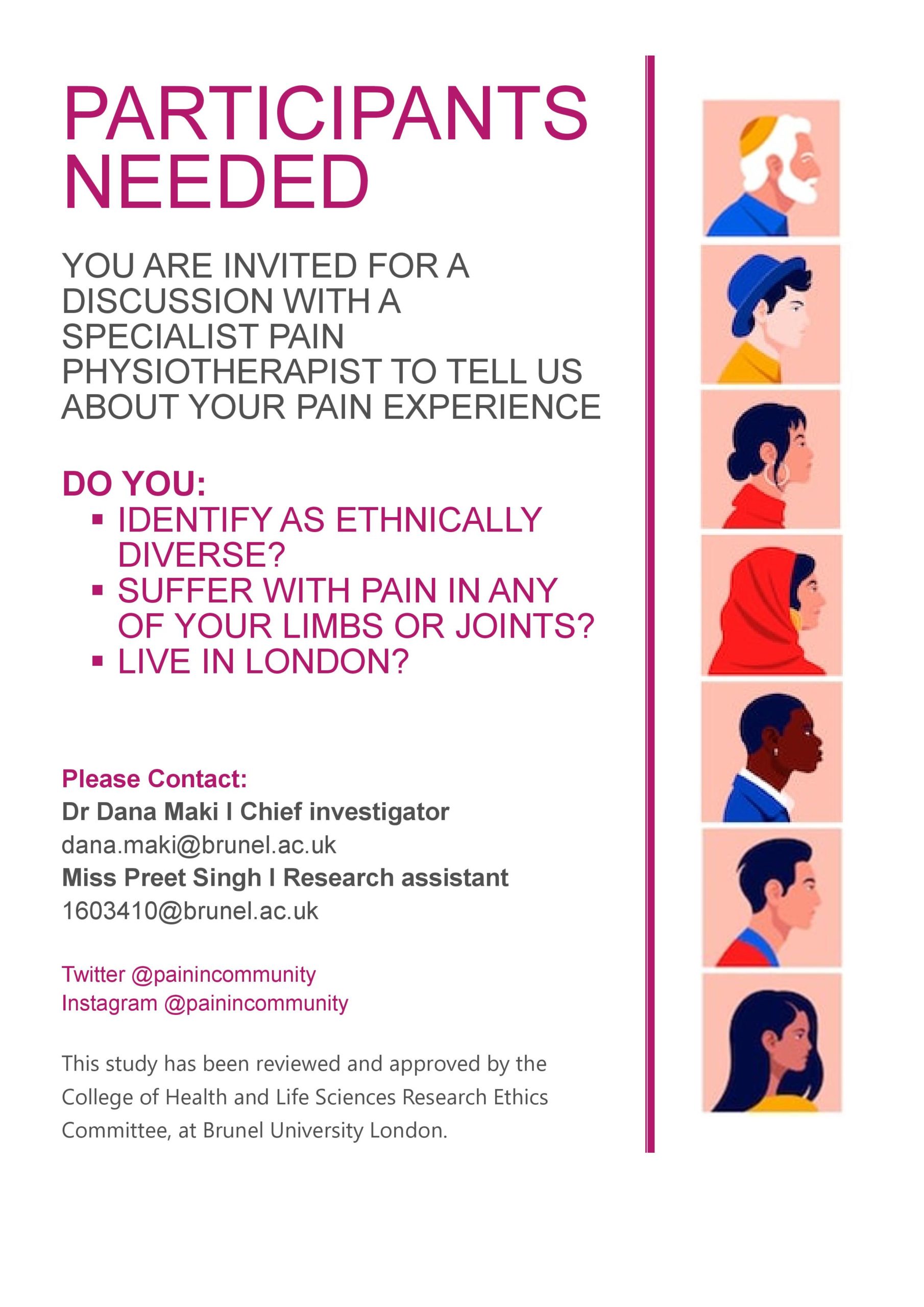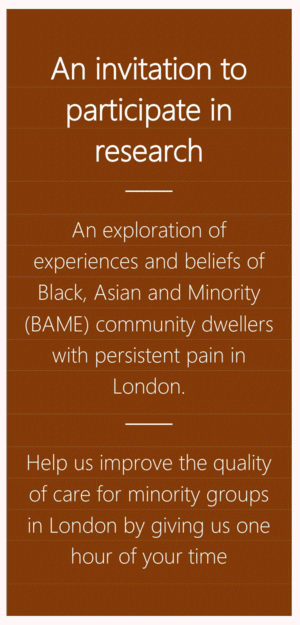 An invitation to participate in research: We want to know your experiences of living with pain in London
An invitation to participate in research: We want to know your experiences of living with pain in London
Recent findings have shown that chronic pain affects up to 50% of the UK population [1]. Of this, Black adults have been found to have higher levels of “high-impact” pain in comparison to their White counterparts [2]. This disparity in the incidence of pain is also reflected in the contributory factors to pain. Researchers [1] have found many factors that are associated with the development of chronic pain including comorbidity, mental health and employment status – factors that are more prevalent in ethnic minorities [3] [4]. Does this suggest higher incidence of chronic pain in minority populations?
This is an invitation to participate in research:
- You are invited for a discussion with a Specialist Pain Physiotherapist & Lecturer at Brunel University to tell us about your experience.
- Help us by telling us about your pain experience so we can improve experiences and facilities for people with pain.
As we know, chronic pain is a complex phenomenon. It has been defined by the International Association for the Study of Pain [5] as an “unpleasant sensory and emotional experience associated with actual or potential tissue damage”. However, we know that pain is influenced by a range of factors such as emotions, relationships, and cultural beliefs [6]. Our beliefs and experiences play a significant role in pain and the under representation of ethnic minorities in research [7] means that we don’t know much about the experiences of minority groups with persistent pain. This may lead to patients being seen as “complex” or being dismissed.
To make sure the voices of minority groups are heard, the @PainInCommunity team aims to explore the experiences of Black Asian and Minority Ethnic (BAME) community dwellers with persistent pain in London. The lead researcher, Dr. Dana Maki from Brunel University London, hopes to interview between fifteen and twenty participants who live within London and suffer with persistent pain in any muscles, joints, or limbs.
By listening to you, the team hopes to find out more about your experiences with persistent pain, how you manage it, and what may stand in the way of you seeking help from healthcare professionals. Covid-19 also presents the team with the unique opportunity to explore how social distancing may have impacted your pain management. Learning more about your experiences will ensure clinicians are able to provide culturally sensitive care to improve treatment outcomes [7].
This research follows a previous study which explored the experiences of physiotherapists working with chronic pain patients from minority ethnic backgrounds. The preliminary findings suggested a range of barriers to providing the best possible care for these patients. Some of these included communication barriers and a lack of understanding of family traditions and religious beliefs. They also expressed cultural differences potentially impacting on the adherence and attendance of their patients, however, were unable to suggest potential reasoning behind this. Combining what the team learns from both studies will allow a deeper understanding of the bigger picture of chronic pain in these under-represented groups.
Who can take part?
- If you suffer with muscular or skeletal pain in any of your limbs or joints.
- You consider yourself to be from a culturally diverse descent such as Black, Asian, or other ethnic minorities.
- You live in one of the 32 boroughs of Greater London.
- You are conversational in English.
What do I have to do?
- You will be screened for eligibility, this includes questions about your condition.
- Your socio-demographic data will be collected.
- You will then be invited for a virtual in-depth one-to-one interview with the researcher at a convenient date and time for you.
- This study has been reviewed and approved by the College of Health and Life Sciences Research Ethics Committee, at Brunel University London.
- The study is funded by the Public Engagement Fund at Brunel University. You will be compensated with a £10 shopping voucher to reimburse you for your time and any costs incurred.
If you would like to know more about this project, or are interested to take part, please contact:
Email: Dr Dana Maki (Chief Investigator), dana.maki@brunel.ac.uk
Email: Miss Preet Singh (Research Assistant), 1603410@brunel.ac.uk
You may be interested in reading the Participant information sheet [WORD doc]
Other ways to contact the team
Find us on Facebook
References
[1] Mills, S. E. E., Nicolson, K. P., & Smith, B. H. (2019). Chronic pain: a review of its epidemiology and associated factors in population-based studies. British Journal of Anaesthesia, 123(2), e273–e283.
[2] Janevic, M. R., McLaughlin, S. J., Heapy, A. A., Thacker, C., & Piette, J. D. (2017). Racial and Socioeconomic Disparities in Disabling Chronic Pain: Findings From the Health and Retirement Study. The Journal of Pain, 18(12), 1459–1467.
[3] Mental Health Foundation. 2019. Black, Asian And Minority Ethnic (BAME) Communities. [online] Available at: <https://www.mentalhealth.org.uk/a-to-z/b/black-asian-and-minority-ethnic-bame-communities> [Accessed 18 June 2020].
[4] Ethnicity-facts-figures.service.gov.uk. 2019. Unemployment. [online] Available at: <https://www.ethnicity-facts-figures.service.gov.uk/work-pay-and-benefits/unemployment-and-economic-inactivity/unemployment/latest> [Accessed 18 June 2020].
[5] Part III: Pain Terms, A Current List with Definitions and Notes on Usage” (pp 209-214) Classification of Chronic Pain, Second Edition, IASP Task Force on Taxonomy, edited by H. Merskey and N. Bogduk, IASP Press, Seattle, ©1994
[6] Gatchel, Robert J., Peng, Yuan Bo, Peters, Madelon, L.; Fuchs, Perry, N.; Turk, Dennis C. 2007 The biopsychosocial approach to chronic pain: Scientific advances and future directions fckLR Psychological Bulletin, Vol 133(4), 581-624
[7] Campbell, C. M., & Edwards, R. R. (2012). Ethnic differences in pain and pain management. Pain Management, 2(3), 219–230.

